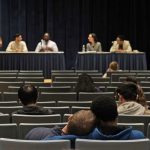When you think of the word “creativity,” do you associate it primarily with women or with men? Do you shout out “Sistine Chapel” or “quilts”? Do you point toward the flash card showing a lone man with a light bulb over his head, or do you choose the one depicting a group of laughing women gathered at a table? Do you see a woman writing a book, a man designing a suit, a woman discovering a new galaxy or a man dancing?
“As a graduate student in education who is placed in an internship in East Hartford, I am preparing for a career teaching such things as reading and math,” says Isaballa Horan. “But teaching goes both ways, and in many instances, my students have taught me far more than I have taught them.”
USG and Student Health and Wellness held a panel about college mental health Thursday in honor of World Mental Health Day. The four panelists — mental health professionals Dr. Sarah Ketchen Lipson and Dr. Clewiston Challenger and UConn students Kanu Caplash and Jovanni Vicenty — came together to give different perspectives and levels of expertise to discuss the topic.
Joseph Renzulli popped up prominently once again in NYC politics just before the start of this school year, with the release of a bombshell education report from a group set up by Mayor Bill de Blasio. The report advised swift action to desegregate schools, including the general elimination of gifted and talented screening as currently done.
Dyslexia makes reading a struggle for millions of people, but the learning disability is rarely diagnosed before age seven. Now, a team of educators and scientists led by UConn professors has made a game-like app that could help teachers identify younger kids at risk.
Devin Kearns began his career as a general education elementary school teacher for third-graders in Los Angeles, where he noticed many students had difficulty reading. The observation would lead to a dramatic shift in the trajectory of his work.
“We saw the Nuremberg trials as a really interesting opportunity to explore the nature of justice and value of critical discernment, especially during a global rise in digital disinformation and anti-Semitism,” says Stephen Slota, Ph.D., an educational psychologist at the Neag School of Education.
“I think overall there is still inequity at the higher levels of education,” Laura Burton said, adding there are still “definitely a lot more men than women at the full professor level.”
Join the University of Buckingham’s CREATE-hub researcher Dr. Gill Hill as she talks about her creativity research alongside Professor James Kaufman, in the latest BPS Research Digest podcast.
“The Landscape isn’t much different than the original Adversity Index, other than [that] the College Board [is] reporting separate scores for the high school and neighborhood indices, and students now can receive their score along with colleges,” Casey Cobb said. “I think the biggest change was the name. They switched it to Landscape to deflect criticism that the scores validly measure adversity.”

